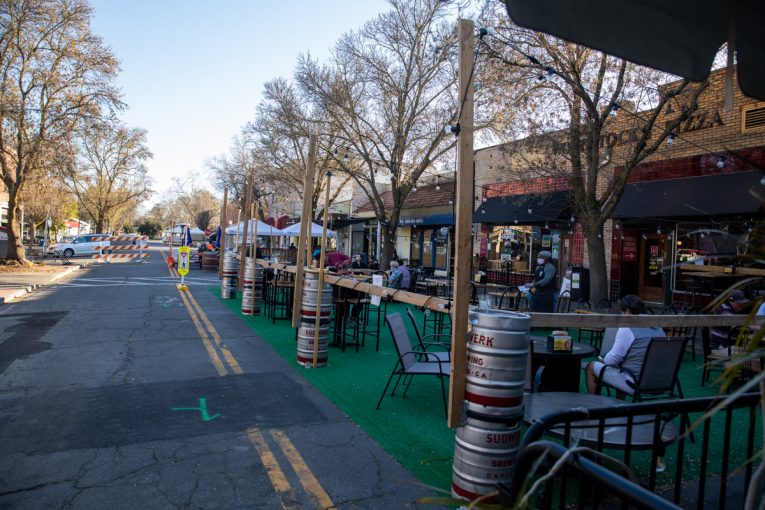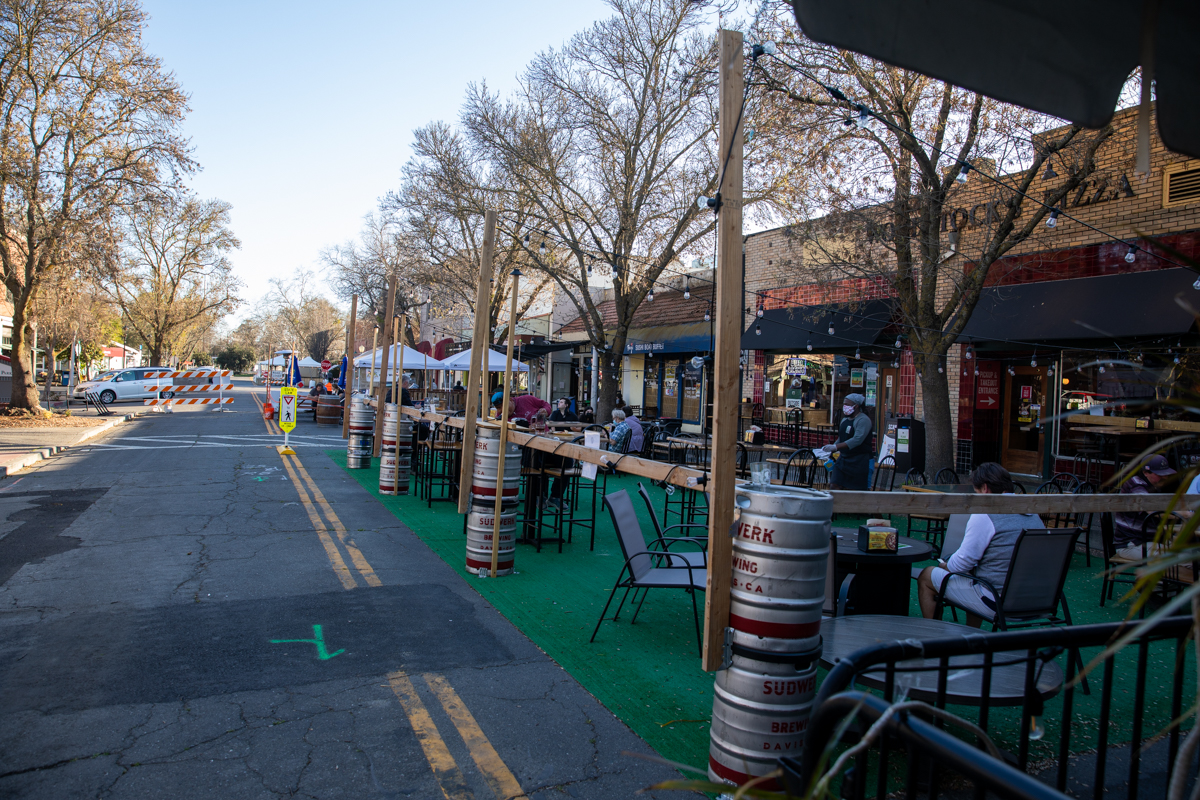

By David M. Greenwald
Executive Editor
Davis, CA – When G Street came up last week before council, I was half expecting a repeat of the parking debate from a few years ago, where people overwhelmingly argued for the return to the prior status quo. I was thus surprised by what transpired.
On G St. itself it played out as expected—the retail type businesses pushed to re-open G St. to vehicle traffic while the restaurants pushed to keep it closed to vehicle traffic to allow for outdoor seating.
The question was really where the rest of the community would come down. I was surprised to hear an overwhelming number of people pushing to keep the road closed to vehicle traffic. When I asked the city how the email correspondence broke down, it was similar—almost 3 to 1 for keeping the road closed.
You might be tempted to say, well of course, Davis is a biking community. But my  experience is that it really isn’t. There is a small contingent of hardcore biking advocates, but in these types of public debates, usually the biking community is drowned out by the car driving community—that’s what happened on parking and perhaps you could argue on the downtown as a whole.
experience is that it really isn’t. There is a small contingent of hardcore biking advocates, but in these types of public debates, usually the biking community is drowned out by the car driving community—that’s what happened on parking and perhaps you could argue on the downtown as a whole.
And yet commenter after commenter came from the perspective of seeing this as an “opportunity to keep this area bike and pedestrian priority versus cars.”
One commenter pointed out, “I think opening up to cars doesn’t make sense. It’s less inviting towards kids and families. I just want to say that when my family and I go to either the, the pizza shop there or the coffee shop, we feel so grateful that we can tie up our dog outside and walk in and walk out and be able to sit down and relax without having to constantly worry about somebody getting hit by a car.”
Another commenter: “As a long time Davis resident who frequently spends time downtown, I have not noticed any negative impact on the closure pertaining to traffic. As a matter of fact, I feel that it is a bonus to downtown businesses. Additional seating increase increases capacity of multiple businesses in the area and encourages patronship keeping G Street closed as it is and potentially adding a more permanent walkway and seating areas will greatly benefit our downtown businesses, citizens, and the city as a whole.”
Another: “I think it’s a wonderful step towards making downtown Davis more walkable and bikable. It’s really just a great space.”
A student noted, “I’m a second year student here at UC Davis, and I’d like to speak against the plans to reopen G Street to cars and traffic. For many students like myself, G Street is one of the best nightlife spots in Davis and is one of the few spots that are fully pedestrian, safe and accessible.
“As I’m sure many other students can attest to going into downtown as a pedestrian or as a biker can be, can be a, can be a pain, especially if there is high traffic on the streets. I myself have had a few close calls trying to cross the road going into downtown when there’s a lot of car traffic. And it’s a problem that’s especially prevalent at night and on streets with high foot traffic streets like G Street, like E Street, like F Street, areas that are huge areas for student traffic.
“Having a closed G Street means a safer and more accessible environment for students to eat, spend time, and most perhaps most importantly, spend their money at our local businesses and restaurants.”
There were a couple of letters in the local paper of note.
One noted, “My own personal experience is with Bremen, Germany, where some pedestrian ways and areas are hundreds of years old and are fused with the modern. It is also a bicycle “town” of a half a million souls where bicycle ways take precedence over auto ways. Amsterdam is an extreme example, as well.”
Another letter noted that they agreed “advocating for a pedestrianized downtown, starting with the block on G Street, between Second and Third streets, already closed to traffic.”
They noted, “Having lived in England for twenty years, it is common to encounter pedestrianized town centers in cities and towns all over Great Britain. This creates the kind of cafe culture our climate is ideally suited for. It encourages people of all ages and abilities, including our consistently overlooked disabled community, to comfortably navigate our town center, without the threat of being mowed down.”
Basically, as Will Arnold pointed out on Tuesday, about one-third of the public space in a given community is ceded to vehicle traffic.
“If I’m gonna be downtown, I’m probably parked somewhere downtown,” Mayor Arnold said. But he said, “We have ceded a lot of our shared public space to one purpose that absolutely negates all other purposes. Once you have cars driving down a street, whether it’s one way, whether it’s two ways, that’s what that street is for. And to tread across it is to take your, to risk your life.”
He noted a huge amount of shared public space is devoted to cars and said, “I am a firm believer that we are now in the position to take back some of our public spaces from these thousand pound machines and reopen them to people.”
He noted at one point it was very controversial the decision to close over Fourth Street in order to create a continuous Central Park, but they did it, it did not harm traffic and improved the community.
I have listened and talked with people concerned with the impact of closing off areas to vehicles. But the rest of the downtown is not thriving with retail. There are empty stores on G St.’s block between 2nd and 3rd, but, then again, there are empty stores further down G Street, as well as in all parts of the downtown.
The complaints about aesthetics are legit. But the solution is putting the resources in through grants and other investments into improvement. I still think that the area can help retail if it is done correctly. But there are other options and locations for impacted businesses as well.






